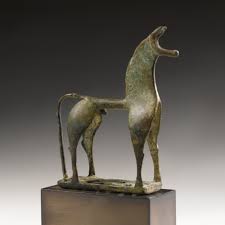By Michael McCullough June 24, 2019
 The federal judge presiding over a lawsuit against the Greek Ministry of Culture rejected the country’s claim of immunity over its assertion of ownership to an ancient bronze figure of a horse owned by the Saretta Barnet Revocable Trust.
The federal judge presiding over a lawsuit against the Greek Ministry of Culture rejected the country’s claim of immunity over its assertion of ownership to an ancient bronze figure of a horse owned by the Saretta Barnet Revocable Trust.
District Court Judge Katherine Polk Failla said Greece’s ownership claim, along with its demand upon Sotheby’s to remove the bronze from auction, amounted to “commercial activity” which would make Greece subject to the Trust’s lawsuit.
The Trust and Sotheby’s filed a lawsuit last year because one business day prior to the auction Greece emailed a letter to Sotheby’s demanding the object’s immediate withdraw from the auction and its repatriation to Greece.
The bronze horse had an acceptable provenance which was published in Sotheby’s catalogue: it was purchased by an unknown buyer at auction in April 1967 at Münzen und Medaillen in Switzerland and later sold to Robin Symes. Howard and Saretta Barnet acquired the bronze from Symes in November 1973.
In order to sue a foreign government in a US court, a plaintiff must show that the foreign government’s action was taken in connection with a “commercial activity” of the foreign sovereign. The commercial character of the foreign government’s activity is determined by reference to the nature of the course of conduct or particular transaction or act, rather than by reference to its purpose. Therefore, the foreign government’s activity need not have a commercial purpose if it’s one that a private party would take when engaged in commerce.
In this case, the Trust and Sotheby’s said that Greece’s activity — attempting to intervene in the market to assert and enforce its purported ownership rights — is clearly the type of activity in which private parties often engage. Judge Failla agreed and rejected Greece’s argument that the ownership claim was a uniquely governmental effort to police the heritage of its nation (the fulfillment of the Greek Ministry of Culture’s public purpose which could not have been fulfilled by a private party) and therefore not commercial in nature. According to the court, Greece “conflates the nature with the purpose of the act. While the purpose of sending the Demand Letter may have been to fulfill the Ministry’s constitutional mandate to protect Greece’s cultural heritage, the nature of the act is analogous to a private citizen attempting to enforce his property rights.”
Unless Greece appeals the decision, the case will go forward to the discovery phase in which the Greek government will have to disclose information in their possession about the bronze horse and will be forced to produce witnesses. Alternatively, Greece will have to recognize the Trust’s ownership of the bronze horse.
 When you send a work of art to an auction house in Paris, you expect that the importation will go smoothly. You don’t expect the French government to intercede in the importation and to advocate on behalf of another government as to why the object is being imported and sold in France.
When you send a work of art to an auction house in Paris, you expect that the importation will go smoothly. You don’t expect the French government to intercede in the importation and to advocate on behalf of another government as to why the object is being imported and sold in France.